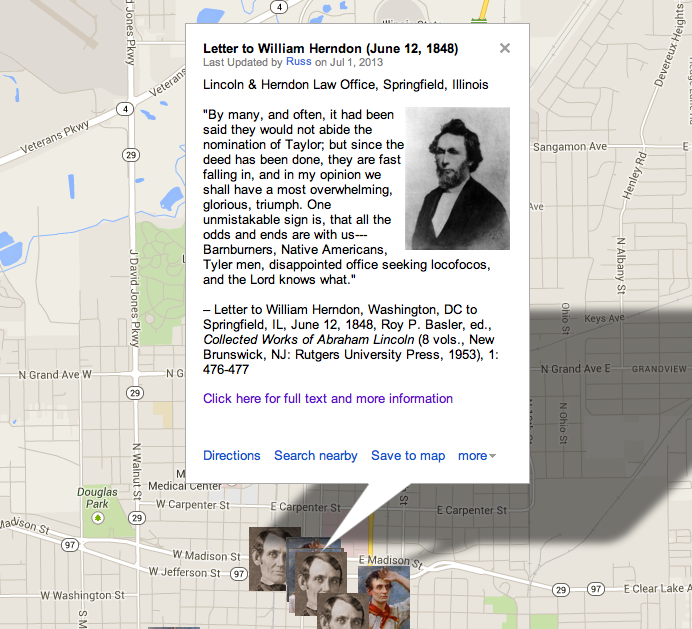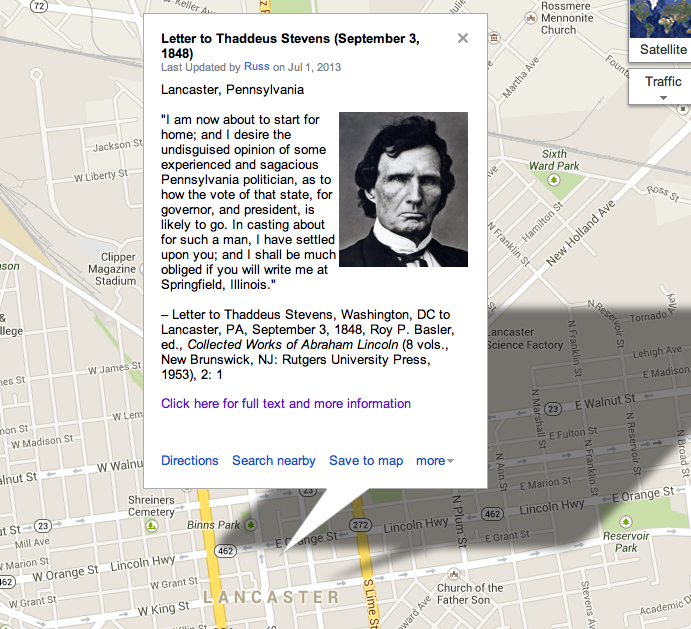Contributing editors for this page include James Duncan
Ranking
#61 on the list of 150 Most Teachable Lincoln Documents
Annotated Transcript
On This Date
HD Daily Report, June 12, 1848
The Lincoln Log, June 12, 1848
Close Readings
Posted at YouTube by “Understanding Lincoln” participant James Duncan, 2016
Custom Map
How Historians Interpret
“Though many northern Whigs were outraged by the nomination of a slaveholder who had never been a true supporter of the party or its principles, Lincoln wrote on June 12 that such disaffected elements ‘are fast falling in” and predicted that ‘we shall have a most overwhelming, glorious, triumph.’ He took heart from the fact that ‘all the odds and ends are with us – Barnburners [Free Soil Democrats in New York], Native Americans, [John] Tyler men, disappointed office seeking locofocos, and the Lord knows what.’ He gloated that ‘Taylor’s nomination takes the locos on the blind side. It turns the war thunder against them. The war is now to them, the gallows of Haman, which they built for us, and on which they are doomed to be hanged themselves.’264 Even Horace Greeley ultimately supported Taylor in order to defeat ‘that pot-bellied, mutton-headed, cucumber Cass!’”
–Michael Burlingame, Abraham Lincoln: A Life (2 volumes, originally published by Johns Hopkins University Press, 2008) Unedited Manuscript by Chapter, Lincoln Studies Center, Volume 1, Chapter 8 (PDF), 809.
“On March 5, 1849, Abraham Lincoln stood among a throng of observers as Zachary Taylor was sworn into office, becoming the nation’s twelfth president. Lincoln had worked long and hard on the campaign trail stumping for the hero of the Mexican War, ‘Old Rough and Ready’ Taylor. The efforts of the outgoing Illinois congressman on Taylor’s behalf included mass mailings of pro-Taylor speeches and documents, active campaigning in four states — Delaware, Maryland, Massachusetts and Illinois — and enthusiastic pronouncements of Taylor as congressman. Lincoln had every right to feel proud of his efforts which — in his mind — helped to win the presidency for the Whig party. Moreover, with the Whigs in control of the executive branch of the federal government, political patronage posts were available in greater abundance.”
–Thomas F. Schwartz, “’An Egregious Political Blunder’ Justin Butterfield, Lincoln, and Illinois Whiggery,” Journal of the Abraham Lincoln Association 8 no. 1 (1986): 9-19.
“In 1848, Congressman Lincoln abandoned his hero, Henry Clay, and worked for the presidential nomination of General Zachary Taylor, whose war record made him a more formidable candidate. Lincoln attended the Whig National Convention as Philadelphia in June, saw ‘Old Rough and Ready’ nominated and returned to Washington exulting over the discomfiture of the ‘locofocos’ – that is, the Democrats.”
–Don E. Fehrenbacher, Abraham Lincoln: A Documentary Portrait Through His Speeches and Writings (Stanford: Stanford University Press, 1964), 62.
NOTE TO READERS
This page is under construction and will be developed further by students in the new “Understanding Lincoln” online course sponsored by the House Divided Project at Dickinson College and the Gilder Lehrman Institute of American History. To find out more about the course and to see some of our videotaped class sessions, including virtual field trips to Ford’s Theatre and Gettysburg, please visit our Livestream page at http://new.livestream.com/gilderlehrman/lincoln


